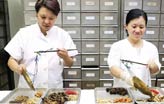People
Roar of the Flying Tigers
Updated: 2011-08-15 08:03
By An Baijie (China Daily)
|
 Wang Yanzhou (left) in his apartment in the coastal city of Rizhao, Shandong province. The old photo of Wang (right) in the Kuomingtang air force uniform hangs on the wall of his apartment. Photos by An Baijie / China Daily |
 |
The 91-year-old Wang Yanzhou is the last remaining pilot on the mainland of the famed flying group that defended the country against Japan. An Baijie reports.
Veteran Wang Yanzhou says he wishes more people were aware of the part he and his fellow Flying Tigers played during the War of Resistance against Japanese Aggression (1937-1945). The 91-year-old is the only living former pilot on the Chinese mainland who flew with the 1st American Volunteer Group (1941-1942), which later became part of the Chinese-American Composite Wing (1943-1945), better known as the Flying Tigers.
Wang shot down five Japanese aircraft during the war.
He now lives in a 100-square-meter apartment in the coastal city of Rizhao, Shandong province. It is a quiet life with his wife, who was paralyzed in 2005 and hasn't walked since then.
In the guest room is a large photo of Wang and President Hu Jintao, taken in 2005 when Hu toasted Wang at a banquet in Beijing to mark the 60 anniversary of victory in the War of Resistance against Japanese Aggression.
He says that since that meeting with Hu six years ago, the question marks about his political allegiance have been wiped away.
Previously, Wang's story was little known because of his political background. He was a Kuomintang pilot captured by the People's Liberation Army (PLA) in 1946, after his fighter jet encountered navigation difficulties.
Wang became a trainer of pilots for the PLA air force, but during the "cultural revolution" (1966-76), he was treated as an "enemy of the people" because of his political history.
There were 381 Chinese pilots in the Flying Tigers unit and most of them left for Taiwan with the Kuomintang after the Communist Party of China (CPC) defeated it.
Wang's war heroics were not recognized until 1983, when an official from the United Front Work Department learned of his situation and reported his case to the central government.
In 1984, Wang got a certificate recognizing him as a retired leading revolutionary, at the age of 64. He was given a pension of 3,000 yuan ($466) a month, which he says is enough for his daily needs.
He has had a painful prostate infection for many years and as such had to hire a maid to help take care of him and his bedbound wife. The maid costs 1,400 yuan a month.
Despite the lack of money and health problems, Wang says he's happy leading a simple life.
"The apartment I live in is provided free by the government," he says.
"So, compared with the past, my living conditions are quite good these days."
After an operation in July 2010, Wang says his health deteriorated and he now feels he needs to tell everyone about his wartime experiences, before it is too late.
Zhao Longliang, CPC branch secretary at Dasunjia village, where Wang lives, says the local government has done everything it can for Wang.
"Wang is a village treasure. We always go to see him and ask what we can do for him," Zhao says. "His heroic tales should be known by more people."
Wang Li, 60, a female volunteer taking care of veterans, based in Yantai, Shandong province, says their stories should be preserved for posterity.
"Their stories should be heard by our children and grandchildren because their spirits are the bones of our nation," she says.

Specials

Flying the TCM flag
A small German town is home to Europe's flagship clinic for traditional Chinese medicine

Hunting grounds
Opinion divided as China debates opening door to international players

Animal attraction
World's youngest chief fur designer set to launch own label and tap into huge China market.